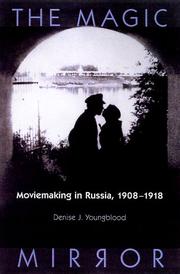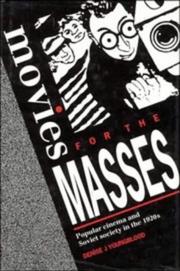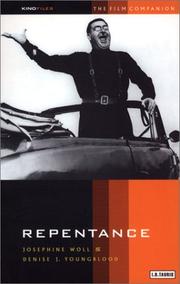| Listing 1 - 10 of 12 | << page >> |
Sort by
|

ISBN: 0299162346 0299162303 Year: 1999 Publisher: Madison (Wis.) University of Wisconsin press
Abstract | Keywords | Export | Availability | Bookmark
 Loading...
Loading...Choose an application
- Reference Manager
- EndNote
- RefWorks (Direct export to RefWorks)
Film --- anno 1900-1999 --- Russian Federation --- Motion pictures --- Cinéma --- History. --- Histoire --- -Motion pictures --- -#SBIB:309H1320 --- #SBIB:309H1313 --- #SBIB:013.AANKOOP --- Denise J. Youngblood --- film --- filmgeschiedenis --- twintigste eeuw --- Rusland --- Puchalski Eduard --- Chardynin Petr --- Lazarev Ivan --- Goncharov Vasilii --- Starewicz Wladyslaw --- Bauer Evgenii --- Siversen Vladimir --- Gardin Vladimir --- Protazanov Iakov --- Larin Nikolai --- Hansen Kai --- Maître André --- Petrov-Kraevskii E. --- Sabinski Czeslaw --- Arkatov Aleksandr --- Romashkov V. --- Iurevskii Iurii --- Wiesielowski Zygmunt --- Slavinskii Evgenii --- 791.43 --- Cinema --- Feature films --- Films --- Movies --- Moving-pictures --- Audio-visual materials --- Mass media --- Performing arts --- History --- De filmische boodschap: algemene werken (met inbegrip van algemeen filmhistorische werken en filmhistorische werken per land) --- Geschiedenis en/of organisatie van het filmwezen: algemeen en per land (met inbegrip van de rol van het filmwezen in de ontwikkelingsproblematiek) --- History and criticism --- Russia --- Cinéma --- #SBIB:309H1320 --- Petrov-Kraevskii E --- Romashkov V --- anno 1900-1909 --- anno 1910-1919
Book
ISBN: 0292776454 Year: 1991 Publisher: Austin University of Texas press
Abstract | Keywords | Export | Availability | Bookmark
 Loading...
Loading...Choose an application
- Reference Manager
- EndNote
- RefWorks (Direct export to RefWorks)
791.43 --- Silent films --- -#SBIB:309H1313 --- Denise J. Youngblood --- film --- Rusland --- Sovjet-Unie --- stille film --- communisme --- marxisme --- politiek --- film en politiek --- Moving pictures, Silent --- Silent motion pictures --- Motion pictures --- Filmkunst. Films. Cinema --- History and criticism --- Geschiedenis en/of organisatie van het filmwezen: algemeen en per land (met inbegrip van de rol van het filmwezen in de ontwikkelingsproblematiek) --- 791.43 Filmkunst. Films. Cinema --- #SBIB:309H1313

ISBN: 0521374707 Year: 1992 Publisher: Cambridge [England] ; New York, NY, USA : Cambridge University Press,
Abstract | Keywords | Export | Availability | Bookmark
 Loading...
Loading...Choose an application
- Reference Manager
- EndNote
- RefWorks (Direct export to RefWorks)
Motion pictures --- Motion pictures --- Popular culture --- Cinéma --- Cinéma --- Culture populaire --- Social aspects --- Aspect social
Book
ISBN: 0292761104 Year: 1991 Publisher: Austin : University of Texas Press,
Abstract | Keywords | Export | Availability | Bookmark
 Loading...
Loading...Choose an application
- Reference Manager
- EndNote
- RefWorks (Direct export to RefWorks)
The golden age of Soviet cinema, in the years following the Russian Revolution, was a time of both achievement and contradiction, as reflected in the films of Eisenstein, Pudovkin, and Kuleshov. Tensions ran high between creative freedom and institutional constraint, radical and reactionary impulses, popular and intellectual cinema, and film as social propaganda and as personal artistic expression. In less than a decade, the creative ferment ended, subjugated by the ideological forces that accompanied the rise of Joseph Stalin and the imposition of the doctrine of Socialist Realism on all the arts. Soviet Cinema in the Silent Era, 1918–1935 records this lost golden age. Denise Youngblood considers the social, economic, and industrial factors that influenced the work of both lesser-known and celebrated directors. She reviews all major and many minor films of the period, as well as contemporary film criticism from Soviet film journals and trade magazines. Above all, she captures Soviet film in a role it never regained—that of dynamic artform of the proletarian masses.
Book
ISBN: 9780292761100 Year: 2021 Publisher: Austin
Abstract | Keywords | Export | Availability | Bookmark
 Loading...
Loading...Choose an application
- Reference Manager
- EndNote
- RefWorks (Direct export to RefWorks)

ISBN: 1860643957 9781860643958 Year: 2001 Volume: 4 Publisher: London ; New York : I. B. Tauris, 2001.
Abstract | Keywords | Export | Availability | Bookmark
 Loading...
Loading...Choose an application
- Reference Manager
- EndNote
- RefWorks (Direct export to RefWorks)
Tengiz Abuladze's allegorical film, made in Georgia, is the best known film of the Perestroika and Glasnost years. With its outspoken and controversial reference to the Stalin era and Stalin's place in the Soviet psyche, ""Repentance"" was originally shelved but ultimately released in 1986 to widespread popular and critical acclaim. This "KINOfile" investigates the production, context and critical reception of the film, and the people who made it, and provides an analysis of the film itself and its place in world cinema.
Book

ISBN: 1618112139 9781306490955 1306490952 9781618112132 9781618112125 1618112120 9798887193656 Year: 2013 Publisher: Boston, MA
Abstract | Keywords | Export | Availability | Bookmark
 Loading...
Loading...Choose an application
- Reference Manager
- EndNote
- RefWorks (Direct export to RefWorks)
This two-volume reader is intended to accompany undergraduate courses in the history of Russian cinema and Russian culture through film. Each volume consists of newly commissioned essays, excerpts from English language criticism and translations of Russian language essays on subtitled films which are widely taught in American and British courses on Russian film and culture. The arrangement is chronological: Volume one covers twelve films from the beginning of Russian film through the Stalin era; volume two covers twenty films from the Thaw era to the present. General introductions to each period of film history (Early Russian Cinema, Soviet Silent Cinema, Stalinist Cinema, Cinema of the Thaw, Cinema of Stagnation, Perestroika and Post-Soviet Cinema) outline its cinematic significance and provide historical context for the non-specialist reader. Essays are accompanied by suggestions for further reading. The reader will be useful both for film studies specialists and for Slavists who wish to broaden their Russian Studies curriculum by incorporating film courses or culture courses with cinematic material. Volumes one and two may be ordered separately to accommodate the timeframe and contents of courses. Volume one films: Sten'ka Razin, The Cameraman's Revenge, The Merchant Bashkirov's Daughter, Child of the Big City, The Extraordinary Adventures of Mr. West in the Land of the Bolsheviks, Battleship Potemkin, Bed and Sofa, Man with a Movie Camera, Earth, Chapaev, Circus, Ivan the Terrible, Parts I and II. Volume two films: The Cranes are Flying, Ballad of a Soldier, Lenin's Guard, Wings, Commissar, The Diamond Arm, White Sun of the Desert, Solaris, Stalker, Moscow Does Not Believe in Tears, Repentance, Little Vera, Burnt by the Sun, Brother, Russian Ark, The Return, Night Watch, The Tuner, Ninth Company, How I Ended This Summer. Authors: Birgit Beumers, Robert Bird, David Bordwell, Mikhail Brashinsky, Oksana Bulgakova, Gregory Carlson, Nancy Condee, Julian Graffy, Jeremy Hicks, Andrew Horton, Steven Hutchings, Vida Johnson, Lilya Kaganovsky, Vance Kepley, Jr., Susan Larsen, Mark Lipovetsky, Tatiana Mikhailova, Elena Monastireva-Ansdell, Joan Neuberger, Vlada Petrić, Graham Petrie, Alexander Prokhorov, Elena Prokhorova, Rimgaila Salys, Elena Stishova, Vlad Strukov, Yuri Tsivian, Meghan Vicks, Josephine Woll, Denise J. Youngblood
Motion pictures --- PERFORMING ARTS / Film & Video / History & Criticism. --- Cinema --- Feature films --- Films --- Movies --- Moving-pictures --- Audio-visual materials --- Mass media --- Performing arts --- History --- History. --- History and criticism. --- History and criticism --- Russia --- Russie --- Rossīi︠a︡ --- Rossīĭskai︠a︡ Imperīi︠a︡ --- Russia (Provisional government, 1917) --- Russia (Vremennoe pravitelʹstvo, 1917) --- Russland --- Ṛusastan --- Russia (Tymchasovyĭ uri︠a︡d, 1917) --- Russian Empire --- Rosja --- Russian S.F.S.R. --- Russia (Territory under White armies, 1918-1920) --- Battleship Potemkin. --- Bed and Sofa. --- Chapaev. --- Child of the Big City. --- Circus. --- Earth. --- Eastern Europe. --- Extraordinary Adventures of Mr. West in the Land of the Bolsheviks. --- Ivan the Terrible. --- Man with a Movie Camera. --- Russia. --- Soviet. --- Stalin. --- Sten'ka Razin. --- The Cameraman's Revenge. --- The Merchant Bashkirov's Daughter. --- aesthetics. --- analysis. --- art. --- cinema. --- culture. --- film. --- history. --- motion pictures. --- movies. --- silent film.
Book

ISBN: 9781474471527 Year: 2022 Publisher: Edinburgh
Abstract | Keywords | Export | Availability | Bookmark
 Loading...
Loading...Choose an application
- Reference Manager
- EndNote
- RefWorks (Direct export to RefWorks)
Book

ISBN: 1845459989 9781845459987 9781845457327 Year: 2010 Publisher: New York Oxford
Abstract | Keywords | Export | Availability | Bookmark
 Loading...
Loading...Choose an application
- Reference Manager
- EndNote
- RefWorks (Direct export to RefWorks)
In 1945, Europeans confronted a legacy of mass destruction and death: millions of families had lost their homes and livelihoods; millions of men in uniform had lost their lives; and millions more had been displaced by the war's destruction, and the genocidal policies of the Nazi regime. From a range of methodological historical perspectives--military, cultural, and social, to film and gender and sexuality studies--this volume explores how Europeans came to terms with these multiple pasts. With a focus on distinctive national experiences in both Eastern and Western Europe, it illuminates how postwar stabilization coexisted with persistent insecurities, injuries, and trauma.
Reconstruction (1939-1951) --- World War, 1939-1945 --- Collective memory --- Memory --- Group identity --- Citizenship --- Military art and science --- Fighting --- Military power --- Military science --- Warfare --- Warfare, Primitive --- Naval art and science --- War --- Birthright citizenship --- Citizenship (International law) --- National citizenship --- Nationality (Citizenship) --- Political science --- Public law --- Allegiance --- Civics --- Domicile --- Political rights --- Collective identity --- Community identity --- Cultural identity --- Social identity --- Identity (Psychology) --- Social psychology --- World War, 1939-1945, in motion pictures --- Retention (Psychology) --- Intellect --- Psychology --- Thought and thinking --- Comprehension --- Executive functions (Neuropsychology) --- Mnemonics --- Perseveration (Psychology) --- Reproduction (Psychology) --- Collective remembrance --- Common memory --- Cultural memory --- Emblematic memory --- Historical memory --- National memory --- Public memory --- Social memory --- National characteristics --- Influence. --- History --- Social aspects --- Motion pictures and the war. --- Law and legislation --- Europe
Book

ISBN: 9780691209708 Year: 2020 Publisher: Princeton, NJ
Abstract | Keywords | Export | Availability | Bookmark
 Loading...
Loading...Choose an application
- Reference Manager
- EndNote
- RefWorks (Direct export to RefWorks)
| Listing 1 - 10 of 12 | << page >> |
Sort by
|

 Search
Search Feedback
Feedback About UniCat
About UniCat  Help
Help News
News